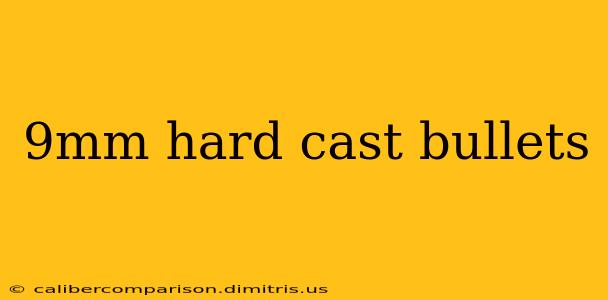Hard cast 9mm bullets have earned a strong reputation among shooters and reloaders for their durability, accuracy, and affordability. This comprehensive guide delves into the nuances of these projectiles, exploring their advantages, disadvantages, and ideal applications. Whether you're a seasoned reloader or a curious newcomer, understanding the characteristics of hard cast 9mm bullets is crucial for making informed choices about your ammunition.
What Makes Hard Cast Bullets Unique?
Hard cast bullets, unlike jacketed bullets, lack a copper or other metal jacket. Instead, they are made by pouring molten lead (often alloyed with other metals like tin or antimony) into a mold. This process creates a dense, solid bullet with several distinct properties:
Advantages of Hard Cast 9mm Bullets:
- Superior Durability: The solid lead construction makes them incredibly resistant to deformation, even at higher velocities. This is especially advantageous in revolvers and other firearms with tighter bores.
- Cost-Effective: Hard cast bullets are significantly cheaper to produce than jacketed bullets, leading to lower ammunition costs for shooters who reload.
- Excellent for Revolvers: The harder alloy is less likely to lead up a revolver's cylinder, making them ideal for frequent shooting.
- Good Accuracy Potential: With proper casting and alloying, hard cast bullets can achieve impressive accuracy levels, often comparable to jacketed bullets.
- Greater Weight Retention: During impact, hard cast bullets tend to retain more weight than jacketed bullets, leading to better penetration.
Disadvantages of Hard Cast 9mm Bullets:
- Potential for Leading: While less prone to leading than softer lead bullets, improper alloying or unsuitable firearm usage can still lead to build-up in the barrel.
- Higher Recoil (Possibly): Depending on the bullet's weight, hard cast bullets can sometimes generate slightly higher recoil than lighter jacketed alternatives.
- Velocity Limitations: While advancements in alloying techniques have improved their performance, hard cast bullets may exhibit lower velocities compared to jacketed bullets in certain firearm platforms.
- Not Ideal for all Firearms: Certain semi-automatic pistols may experience malfunctions with hard cast bullets due to the increased friction and potential for leading.
Selecting the Right Hard Cast 9mm Bullets:
Choosing the correct hard cast 9mm bullets depends on various factors, including your firearm, intended use, and personal preferences. Consider the following aspects:
Alloy Composition:
The alloy composition directly affects the bullet's hardness, density, and performance. A well-balanced alloy ensures optimal hardness for durability without excessive brittleness.
Bullet Weight and Shape:
Different weights and shapes impact ballistics, including velocity, trajectory, and penetration. Heavier bullets generally offer greater penetration, but at a potential cost of velocity.
Lubrication:
Proper lubrication is vital for preventing leading and ensuring smooth feeding in semi-automatic firearms. Many hard cast bullets come pre-lubricated; however, additional lubrication may be necessary depending on the firearm and the specific bullet.
Applications and Uses:
Hard cast 9mm bullets excel in specific applications:
Revolver Shooting: Their robust design is perfect for the higher pressures and tighter tolerances found in revolvers, where they provide superior durability and accuracy.
Practice and Training: Cost-effectiveness makes them an excellent choice for high-volume practice sessions.
Hunting (Limited): While not the ideal choice for all hunting scenarios, appropriately weighted and designed hard cast bullets can be effective for smaller game at close ranges.
Self-Defense (Careful Consideration): While usable, the lower velocity compared to jacketed ammunition warrants thorough evaluation to ensure reliable expansion and penetration for self-defense applications.
Conclusion:
Hard cast 9mm bullets offer a compelling combination of durability, affordability, and accuracy for specific applications. Understanding their advantages, disadvantages, and the factors influencing their performance allows you to choose the right ammunition for your needs. Always remember to consult your firearm's manual and practice safe handling procedures. Choosing the right bullet for your firearm and application is essential for safe and effective shooting.

